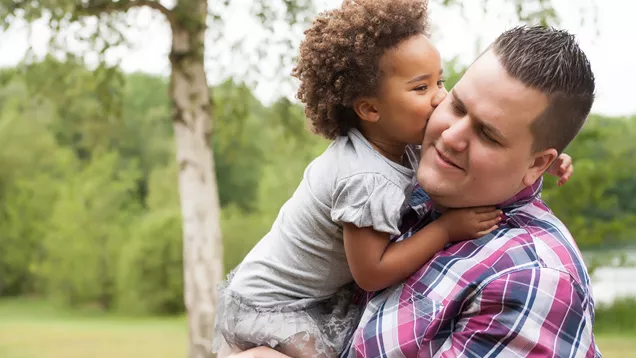There are over 78,000 children in care in England and over 56,000 of them live with foster families. Every year 30,000 children come into care, which is why there is such a need for foster families. A quarter of all children in need of care are from Black, Asian and other minority backgrounds.
Unfortunately, the numbers of children coming into care continues to rise. There are almost 10,000 more children in care than in 2015.
There can be a common belief that children are in care due to their behavioural problems or that children have been taken into care unnecessarily. However, this simply isn’t true. Most children are in care because they have experienced neglect or abuse, or because they are at high risk of neglect or abuse.
Children can also be in care because a parent is unwell, has died or is serving a custodial sentence and there is no other suitable family member to care for them.
Abuse
There are three forms of abuse that can lead children to needing foster care.
Physical abuse
This often comes to light following a pattern of unexplained injuries which include bumps, bruises, broken bones and scolds.
Sexual abuse
Sexual abuse against children is commonly undertaken by someone known well to a child, it can take a long time to become detected as it can be normalised by the adult to a child or be a secret which they mustn’t tell. Recent historic sexual abuse cases which have been highlighted in the media, demonstrate the tricks perpetrators can employ to keep their activity hidden. Sexual abuse includes Child Sexual Exploitation (CSE), although these children have been abused outside of the home, some may come into care to move outside of the area where the gang has been active so they can’t find the young person involved.
Emotional abuse
This form of abuse can often be underplayed in some people’s minds, but is every bit at damaging to a child as any other form of abuse. Being made to live in constant fear, constant humiliation has a hugely damaging effect on a child’s development and does lasting harm for life. Likewise a child can be emotionally abused by not being given any attention at all. This causes significant harm to a developing child’s brain.
Neglect
Neglect comes in many forms, but all of which are equally damaging.
Physical neglect
Children suffer physical neglect when their basic physical needs haven’t been met. This can include not having enough food, clothing, adequate shelter (this would include living in unsanitary conditions). Physical neglect can also include not being supervised in accordance with a child’s age. Children who have experienced neglect often look ‘scruffy’ and have a poor standard of hygiene. Child protection teams know that all children look ‘scruffy’ from time to time, it’s part of being a child – but when this is consistent it can raise concerns which are looked into further.
Emotional neglect
Means that a child hasn’t receive the nurture they need. We all need emotional warmth, but if a child doesn’t receive this is can have a lasting detrimental effect on their brain development.
Other forms of neglect
Neglect can also include educational neglect, when a parents or guardian doesn’t ensure a child attends school and medical neglect, when a child doesn’t receive proper health or dental care or if a parent or guardian refuses to follow medical advice for a child.
Other reasons
Domestic violence
Children may witness domestic abuse, which although hasn’t been targeted at the child, still places them as risk of injury but most significantly emotional harm.
Parent’s illness or disability
Sometimes if a single parent becomes too unwell to care for a child, short term fostering may be needed to help the parent. Sometimes a parent’s own disability means that they need help due to their own mobility, mental health capacity or because a parent is struggling to manage their children’s disability.
Families in acute stress
Acute stress can cover a range of issues, but would include a significant family member’s death, financial issues, homelessness, trouble with the police or gang involvement may involve a foster family being needed to help out for a short period of time.
Death of a parent or guardian
If nobody is able to care for a child after the death of their parent or legal guardian, long term foster care or adoption maybe the only options available.
Why choose ACS?
Frequently asked questions
Will foster children have difficult behaviour?
Many of the children we care for have suffered trauma in their young lives due to abuse, neglect or witnessing domestic violence. Children can find it very difficult to regulate and express their emotions so instead this can come out in their behaviour. Children maybe angry and become aggressive, or can be just the opposite and be very withdrawn. Every young person is different and will behave differently. It’s also worth noting that not every child presents with difficult behaviour and all of our foster parents experience these challenges differently too. What can be difficult to manage for one family will be much easier for another, which is why matching is so important to us. We provide all of our fostering families with training, to help them understand the reasons for certain types of behaviour and how to manage it. By far the most rewarding part of being a foster parent is seeing the changes a child or young person makes whilst in your care.
How does the matching process work?
We receive far more referrals for children from local authorities than we have fostering families with vacancies. In order to match a child to a family, we look at a number of things including location, age range and gender. We also look at the cultural needs of a child and a families own make up and experience. We request as much information from the local authority about the child they are looking to place, so we know as much about them as possible to ensure our foster parents can meet their needs.
Can I choose how long I want a child or young person to stay with me?
How long a child stays with you depends on the plan for the child. Some children will return home or go on to adoption, others will stay in long term foster care. It’s really important to us, that our foster parents give children stability whilst in their care. Many children have experienced multiple foster homes, and we will support you to make a commitment to a child for as long as they need it.
What are foster children like?
Foster children are just like any other child. Some may be struggling to deal with issues from the past, but all children need fun, humor, routine and to feel cared for and wanted.

Finance & Allowances
Visit our financial calculator to see how much you could earn as a foster parent for ACS.

Apply to foster
Ready to apply to become a foster parent? At ACS we are here to help you every step of the way. Get in touch today.
Think you’d make a great foster parent?
Whether you’re ready to start your journey or just want to chat to an expert, we’re here to talk.
Enquiry
The company takes the requirements of GDPR seriously in ensuring the privacy and lawful processing of personal data provided to us by you. Please view our privacy notice which explains how the company will manage and use your personal data. This site is protected by reCAPTCHA and the Google Privacy Policy and Terms of Service apply.
Can’t find what you’re looking for?
By Phone
One of our team is available to talk to you over the phone to answer any of your fostering queries.
By Email
You can get in touch by filling out our online enquiry form with any queries that you may have.
Visit an office
Active Care Solutions, 34-35 Pure Office, Broadwell Rd, Oldbury, B69 4BY
